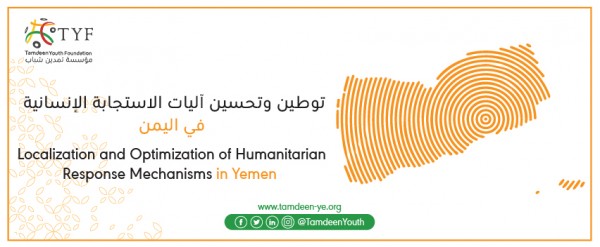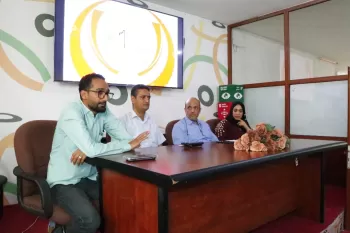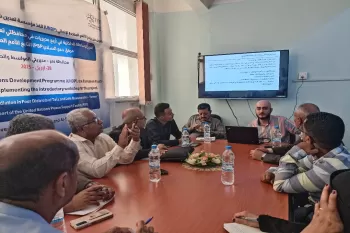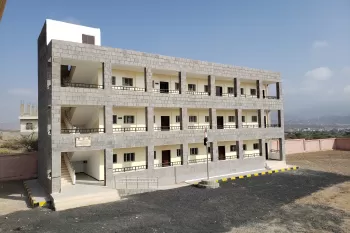To Correct Humanitarian Response Track and steer Aid towards Sustainable Development; Local Civil Society Organizations Launch their Initiative to “Localize Humanitarian Action” in Yemen
On the occasion of World Humanitarian Day and in partnership with the Civil Coalition for Development and Humanitarian Response and NEAR Network, Tamdeen Youth Foundation organized an extensive meeting with local civil society organizations about humanitarian action localization, improving the humanitarian response mechanism, and strengthening peace efforts resulting in the launch of an initiative to localize humanitarian action in Yemen.
The initiative was initiated out of the urgent local need and relevant international agreements such as the "Grand Bargain" and the “Charter for Change”.
The meeting held virtually through the Zoom application and attended by 67 local organizations discussed the reality of humanitarian action localization in Yemen, the obstacles and challenges facing the humanitarian action localization, and the role of civil society organizations in promoting humanitarian response efforts.
The meeting is part of a series of meetings sponsored by Tamdeen Youth Foundation with local organizations, and international organizations supporting humanitarian action localization in Yemen; where several meetings were organized, led by the coordinator of the initiative of localizing humanitarian action in Yemen, Mr. Hussein Al-Suhyali, most notably with the US envoy to Yemen, Tim Lenderking, and Secretary-General of the Danish Refugee Council, Audrey Quafford, in which Tamdeen Youth Foundation presented the importance of localization and the urgent need to institutionalization humanitarian work in Yemen during that they discussed the challenges and obstacles stand in the way of localization and the available opportunities.
The meeting came out with a joint statement by local civil society organizations on their initiative to localize humanitarian action in Yemen, which stated:
Local civil society organizations in Yemen join the global campaign "Race for Humanity" and express their thanks and gratitude to all workers in the relief and humanitarian services field who risk their lives and strive with every effort to help and save communities stricken by wars, conflicts, and disasters.
They also renew their call to the conflict's parties in Yemen to establish a ceasefire and engage in a serious and comprehensive dialogue to save the Yemenis' blood and put an end to the human tragedy experienced by the population and be ready for the reconstruction of the country and the start of a new phase of peace, stability, coexistence, and construction.
In conjunction with the challenges facing the aid track in Yemen, the inability to contain the humanitarian crisis, and to stop the accelerating deterioration situation in all indicators on all economic, social, and humanitarian levels, despite UN assurances that it has carried out through relief agencies by the largest and fastest assistance operations in modern history; The local civil society organizations in Yemen request to reassess the humanitarian response and a correction of its track, and lunch their initiative to localize humanitarian action in Yemen, calling on donors, United Nations agencies and international organizations, to implement the commitments and charters signed in this regard. Also, request everyone, including the Governments of Sana'a and Aden, as well as the Supreme Council for the Management and Coordination of Humanitarian Affairs and International Cooperation (SCMCHA), and the High Relief Committee, to consult with local organizations on the contents of the initiative and its following items:
1. Neutralize humanitarian work from the agenda of war and conflict.
2. The United Nations agencies and international organizations implement their commitments to localize humanitarian assistance that enshrined in the “Grand Bargain” and the “Charter for Change”.
3. Assess the emergency humanitarian response funds', that been spent, impact in Yemen since the beginning of the crisis in 2015.
4. Reconsider the United Nations agencies' strategy radically in managing the humanitarian crisis' response to in Yemen, in a way that meets the society's actual needs and promoting the institutional build-up of local actors.
5. Fill the gap between humanitarian and development activities, and allocating the largest amount of aid and grants to development projects, to meet the long-term population's needs .
6. Support local organizations in the initiative to localize humanitarian action in Yemen, with the assistance of the Supreme Council for the Management and Coordination of Humanitarian Affairs and International Cooperation (SCMCHA) and the (High Relief Committee), to guide agencies, organizations, humanitarian funds and donors, to support the local organizations' proposals in economic empowerment and sustainable development.
7. Enable local organizations to propose, design, and manage projects that meet the local communities' actual needs, create job opportunities, and achieve sustainable positive results.
8. Establish an independent entity comprising representatives of local organizations, the public, and private sectors, to analyze the donors' support and to come up with how to contribute to enhancing mutual trust, increasing funding, and improving performance and transparency in grants and assistance.
9. Support local organizations' pioneering and innovative projects proposals, and build an effective partnership with institutions for financing small and medium projects, the private sector, the governments of Sana’a and Aden, and supporting international organizations.
10. Donors should consult with local organizations and stakeholders to identify priorities and put interventions in their context before launching any call for proposals.
11. International organizations should incorporate their partnership commitments, by creating strategic partnerships, promoting capacity building for local organizations, allocating part of the funds to strengthen its institutional structures and systems in automation and governance, and enabling them to obtain direct funding to implement their humanitarian and developmental interventions.
12. Consulting with local organizations and agreeing with them on a clear framework and a binding mechanism for all parties to start humanitarian action localization in Yemen, to put the country on the track of sustainable peace and development, and working together to take effective measures to combat poverty and achieve internationally agreed development objectives.
13. Support the multi-sectoral plan to raise the level of nutrition "SUN", to reduce malnutrition rates and improve the humanitarian response mechanism.
14. Neutralize service institutions, especially education and health, from the conflict agenda, and providing salaries of their employees.
Finally:
Civil society organizations in Yemen affirm that they are the most capable of meeting the society needs, and have proven their ability to access and implement their programs, projects, and interventions in all geographical areas in Yemen, with a better understanding of the local context and the population's peculiarities, its adherence to the humanitarian action localization and its commitment to fair, transparent and responsible partnerships with all.
Issued by:
- Tamdeen Youth Foundation
- National Foundation for Development and Humanitarian Response
- Yemeni Development Network for NGOs (YDN)
- Abs Development Organization for Woman and Child (ADO)
- Life Makers Meeting Place Organization (LMMPO)
- Sustainable Development Foundation (SDF)
- SOUL for Development
- Medical Mercy Foundation
- Building Foundation for Development - BFD
- Youth Without Borders Organization for Development.
- All Girls Foundation for Development
- Family Counselling & Development Foundation
- Yemeni Women's Union
- Al Aman Organization for Blind Women Care
- Hemmat Shabab Foundation For Development
- Ethra Foundation
- Rawahel Foundation for Development
- Wa3i Foundation
- Field Medical Foundation FMF
- Nahda Makers Organization -NMO
- Civil Alliance for Peace
- Afaq Shababia Foundation
- Marib Girls’ Foundation
- Alf Ba Civilian and Coexistence Foundation
- Yemeni Response Council "YRC"
- Enjaz Foundation For Development
- Future Social Charity Association
- Look INSIDE
- Yemen Medicine Bank
- Khadija Foundation For Development
- Yemen AlKhair for Relief & Development Foundation
- Jeel Albena
- Gusoor Organization for Peace Co-existence
- Democracy School
- Musanadah Foundation for Development
- As-Salam School
- Yemen Entrepreneurs Foundation
- Together Foundation
- Coordination Committee
- Tatweer Foundation
- Mysarah Foundation
- Volunteers Foundation.
- Youth without Bordars Organization
- Sheba Youth Foundation for Development
- Millennium Development Foundation (MDF)
- Sada Foundation for Building & Development
- Monitoring Foundation for Human Rights
- National Prisoner Foundation
- Eaha’s Foundation for calm & Social Peace
- Social Development Hodeidah Girls Foundation
- Basma Foundation For Child Development &Women
- The Center of Strategic Studies to Support Women and Child
- Social Peace Promotion & Legal Promotion
- Peace and Building Foundation
- Food Bank
- Yemeni Psychological Association
- Heran Foundation for local Development
- Estijabah Foundation for Humanitarian Aid & Relief
- Manarat Foundation
- Social Solidarity Foundation for Development
- Yemen Health Foundation
- Federation of Chambers of Commerce
- National Org for Health Development,
- Yemen Association For Development
- Wama Foundation for Development and Human Rights
- Generation Without Qat Organization
- Estijabah Foundation for Humanitarian Aid and Relife





